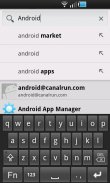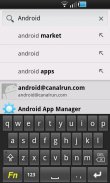




Macro Keys

Description of Macro Keys
Macro Keys by CanalRun is a simple soft keyboard replacement with 2 improvements. A 2 percent boundary was inserted around the keyboard so that the edge keys, like "q" and "p" can be pressed even if your phone has a protective case. Second, a function key is added. Pressing the function key followed by a single character key causes one of the predefined "macros" to be inserted into the text field.
The macros are predefined and stored in an editable file named: macros.xml. This file can be edited on the device, using a text editor, or the file can be transferred and edited on a PC or Mac.
Security: The macro file is not encrypted. Anybody with access to your phone or tablet can view the macro file. Requiring a password to gain access to the phone is suggested. Also, not using the macro definitions to store passwords, your Social Security number, or any other sensitive information is strongly suggested.
Installing Macro Keys:
Using the QR code above or from the Android Market app on your device, download and install Macro Keys. You can search for CanalRun on the Android Market.
Open your devices Settings app. Scroll down and click on the "Locale", "Text", or "Keyboard" settings option. Every device is different, my device says "Locale and Text", but yours may say something different.
Enable the entry "CanalRun Macro Keys". You will see a standard Android warning. The Macro Keys application does not collect any user information.
Exit the settings app. In any text field long click on the text field. A dialog box will pop up. One of the choices in the dialogue will be "Input Method". Click on this.
One of the choices for input methods will be "CanalRun Macro Keys". Enable this choice.
On the lower left-hand side of the keyboard, if you see a key labeled "Fn", installation was successful. You're now ready to use Macro Keys.
Editing macros.xml:
During installation Macro Keys creates a default macro file containing a single macro for the "a" key. When the "Fn:a" key combination is pressed, the string "Android" is output. Try it: press the "Fn" key, note it turns yellow, now press the "a" key, the text "Android" is sent to the text field.
You will find the file "macros.xml" in a directory that allows the file to be read and written to. On my device the directory is: "/mnt/sdcard/canalrun.apps.softkbd/". Yours should be similar, although it may be a little different on your device. You may have to search around a little.
Open the file with a text editor. You could use an editor on the device, or what I do, is use an FTP program to transfer the file to my PC. I edit the file on my PC and then send it back to the device – this seems to be a little easier.
The file is an XML file and can be edited with a regular text editor. In the file you will see a line that contains "key=a Android ". This line defines the "a" macro. The text "Android" is sent when the "Fn:a" key combination is pressed.
Suppose you want to enter your e-mail address each time the combination "Fn:e" is pressed. On the next line of the macros file create a similar entry substituting "key=e" and "<a href="mailto:bob@gmail.com">bob@gmail.com</a>". Save the file. Now every time "Fn:e" is pressed, the string "<a href="mailto:bob@gmail.com">bob@gmail.com</a>" is sent.
Go to <a href="https://www.google.com/url?q=https://www.google.com/url?q%3Dhttp://android.canalrun.com%26sa%3DD%26usg%3DAFQjCNGz90MyGBqwsUixIpms49Pa1JdISA&sa=D&usg=AFQjCNFW91N0joHRPEIykaUavEl6iGNE4w" target="_blank">http://android.canalrun.com</a> for more information.
Added Later …
You can enter special characters using XML predefined entities. Use the format "&name;" (without the quotes). If you wanted to enter a less than sign, you would type the 4 character string "<" (without the quotes) in the XML file.
a full description of XML entities can be found on Wikipedia at: <a href="https://www.google.com/url?q=https://www.google.com/url?q%3Dhttp://en.wikipedia.org/wiki/List_of_XML_and_HTML_character_entity_references%26sa%3DD%26usg%3DAFQjCNHBs8M-1VdGzafy3tpdiazX55eI_Q&sa=D&usg=AFQjCNHcE8s_zsZ7-NPZoonEoAZtSWc1qQ" target="_blank">http://en.wikipedia.org/wiki/List_of_XML_and_HTML_character_entity_references</a>

























